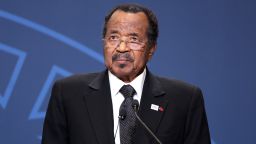Cameroon held a crucial presidential election on October 22, 2023, where voters cast their ballots to decide the future leadership of the nation. The contest could allow President Paul Biya, who is currently 92 years old, to extend his lengthy rule by another seven years. If successful, he would be 99 years old upon the conclusion of his term. Biya first ascended to power in 1982 after the resignation of Cameroon’s first president, Ahmadou Ahidjo. Since then, he has been the sole leader of the country, winning seven subsequent elections.
Analysts widely anticipate a victory for Biya, although his health has raised concerns among the electorate. Reports indicate that he spends significant time in Europe, delegating day-to-day governance to close party officials and family members. This situation has led to speculation about his ability to serve another full term.
Dr. Benjamin Akih, an activist and professor at Syracuse University, suggested that the opposition candidate, Issa Tchiroma Bakary, could pose a serious challenge. “I think this election is different,” he stated, noting Biya’s age and the country’s deteriorating conditions under his long tenure. “Mr. Biya was the weakest candidate the CPDM could put forward… the challenges facing us are more pressing,” Biya stated in his campaign announcement.
Biya faces nine opposition candidates, including former allies such as Bello Bouba Maigari and Bakary. He cast his vote at a primary school in Yaounde, where he chose to refrain from commenting on his future plans until after the election results are announced, expected by October 26.
Concerns about the integrity of the voting process have been voiced by opposition figures. Joshua Osih, representing the Social Democratic Front and fourth-place candidate in the 2018 elections, expressed worries regarding potential voter fraud. He emphasized that the counting process could be lengthy and complicated. “The system makes it such that the elections cannot be free and fair,” Osih remarked.
The electoral process in Cameroon involves a single round of voting, where the candidate with the most votes is declared the winner. With approximately 8 million voters eligible, including over 34,000 living abroad, the election is being held at more than 31,000 polling stations across the nation.
Young voters like Cheukam Ginette, a 34-year-old environmentalist and first-time voter, expressed their discontent with the current administration. “Things have to change. Life is expensive, getting medical care is not easy,” she said outside a polling station in Yaounde, adding that she voted for the opposition due to a lack of confidence in the electoral process.
Biya’s campaign included promises of change, particularly aimed at improving conditions in the impoverished northern regions of Cameroon, which account for nearly 20% of eligible voters. However, the country is grappling with several significant challenges, including an ongoing secessionist conflict in the western regions and the spillover of violence from the Boko Haram insurgency in the north.
According to estimates from the United Nations, around 43% of Cameroon’s population lives in poverty, struggling with basic living standards such as income, education, and health. As the election unfolds, citizens remain hopeful for a change in leadership that could address these pressing issues.
